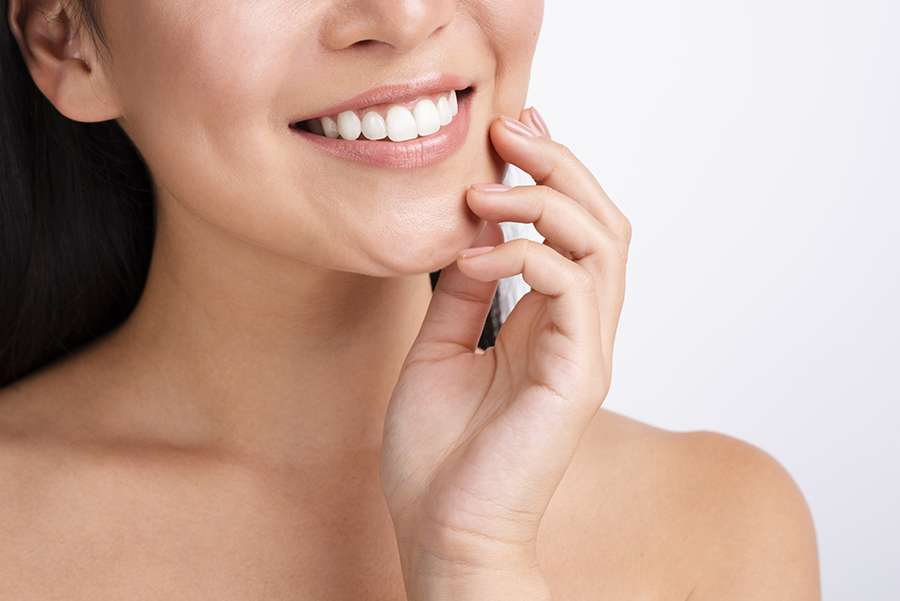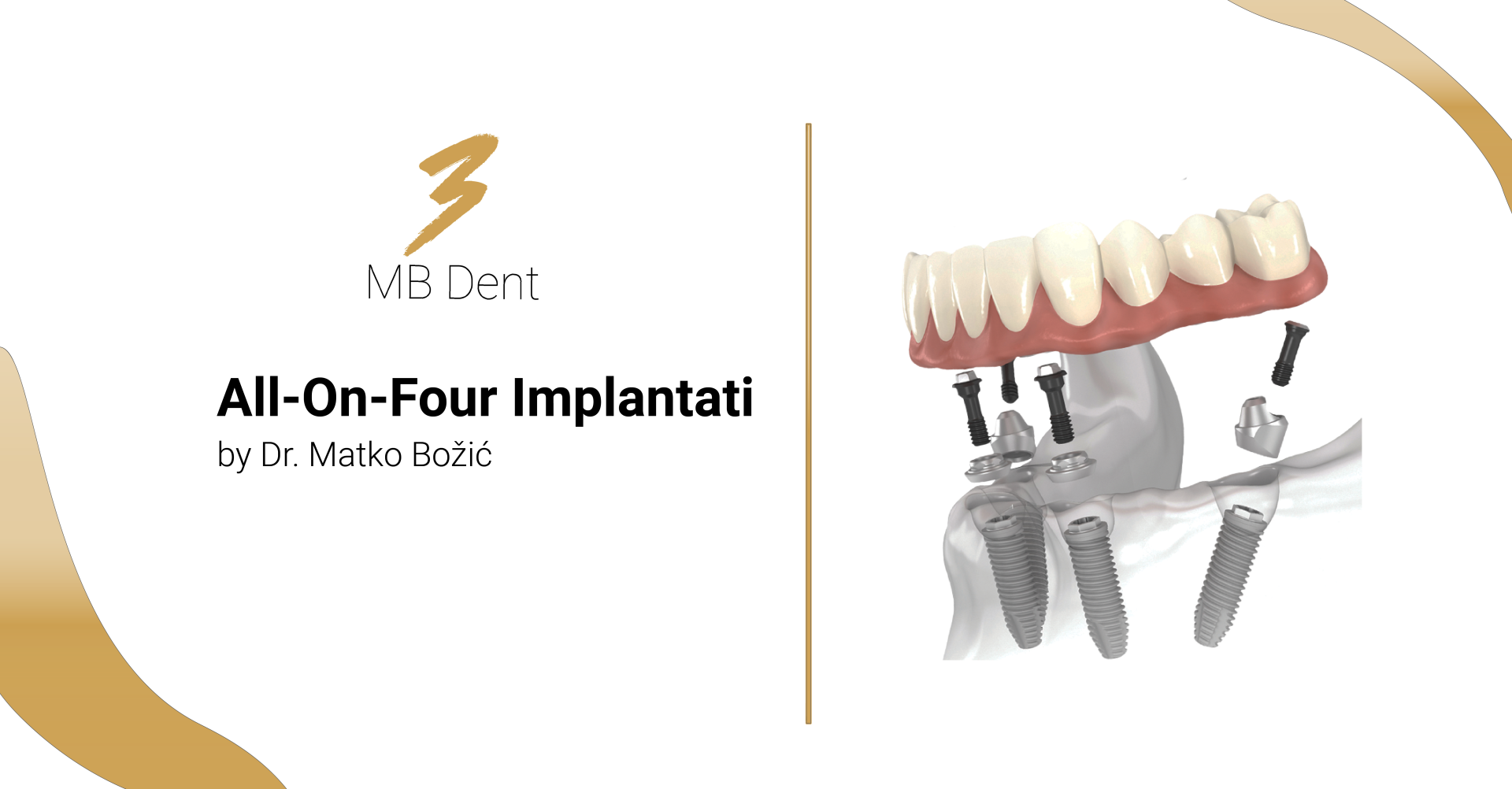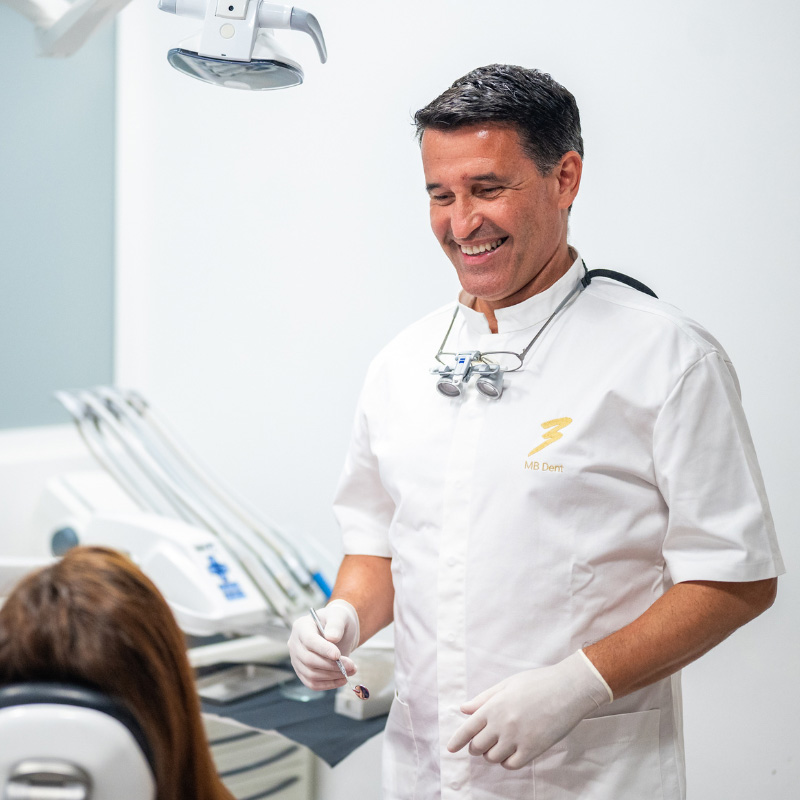Ceramic crowns, along with composite fillings, are one of the most commonly used methods for restoring the functionality and aesthetic appearance of teeth. If you have a problem with a fracture or hole in the natural crown of a tooth, are not satisfied with the color and aesthetics, you are in the right place to get all answers from the specialists at MB Dent clinic.
What is a ceramic crown and does it make the tooth stronger?
A ceramic crown is an artificial replacement that is made in a dental laboratory under the supervision of a dentist. Its task is to replace a broken tooth or a tooth crown with which the patient is not satisfied, both in functional and aesthetic terms.



Today’s technology, the skill, and education of dentists and dental technicians can achieve top-notch results, and it often happens that the artificial crown is so similar to the natural tooth that they are hard to distinguish. A ceramic crown can also be made as the final work on an implant.
When is it advisable to make a ceramic crown?
- When a tooth is so decayed that an endodontic procedure must be performed. After endodontic treatment, it is advisable to make a crown, because the tooth is no longer vital and as such is weakened and can crack.
- When a large part of the natural crown is decayed due to a large cavity.
- In cases of tooth trauma and fractures.
- When large fillings are restored with composite fillings, and the ratio of tooth to composite part is really small, there is a great possibility that the composite filling will crack due to biting forces.
- In patients where there is significant enamel abrasion, either due to a genetic deficiency or the patient’s bad habits.
- A crown is also made in situations where it is necessary to install an attachment, i.e., a connection for holding dentures.
- A crown is made as the final part of therapy in implantology when reconstructing on an implant.
What are dental crowns made of?
There are several types of crowns:
- Metal-free crowns
With the development of CAD CAM technology, it is now possible to computer-generate a complete crown from zirconia. The materials are biocompatible, highly durable, and highly aesthetic, so such crowns look very natural for many years. These crowns are commonly referred to in literature as “metal-free” or metal-free crowns. - Ceramic crowns on a zirconia base
In such crowns, a core of zirconia is made that looks like a miniaturized tooth, and then ceramics are layered and shaped into a natural tooth in several stages. If the dental technician is well-educated in layering ceramics, such works look very good, almost natural. - Pressing technology for crowns based on press lithium disilicate glass and Zi press fluoroapatite glass, i.e., pressing on zirconium
The most common products in our market are IPS e.max press and IPS e.max Zir press. They are used for making aesthetic crowns and ceramic veneers only for individual teeth. For making crowns in blocks, CAD CAM technology is always used, which uses much more durable materials. - Metal ceramic crowns
A base of metal, which is from 0.3 mm to 1 mm thick, is layered with ceramics in several layers, and by reflecting light, the natural tooth is attempted to be reconstructed. The only problem with such crowns is that over time, due to aging, the patient’s gum may recede, and then the metal edge can shine through the teeth.
How long does it take to make crowns?
The production of crowns depends on the skill of the dentist and his dental technicians and the organization of the process itself. Digital technology speeds up the entire crown-making process.
The dentist first has to prepare and plan the entire process, and then moves on to the phase of grinding teeth, taking impressions, and making provisional crowns. No patient from the MB Dent clinic leaves without provisional crowns.
Afterward, the dental crowns are sent for fabrication in the laboratory and, if completed, are tried in the patient’s mouth to check if everything is correct with the function and aesthetics.
The final phase is the cementing of the crown, which is very important because it is necessary to determine which cements to use for cementing the construction and how. On average, it takes from 5 to 7 days to make one or more crowns.
Is the treatment of making and preparing a crown for a tooth painful for the patient?
The patient feels no pain during tooth preparation. If the patient feels sensitivity after the treatment, the tooth can be coated with desensitizers and fluoride preparations.
Will there be a noticeable difference in appearance and aesthetics between a natural and an artificial tooth?
With the development of technology, nature can almost be copied. Therefore, the appearance of the final work is so good that it’s hard to recognize the difference between a natural and an artificial tooth.
How is a crown cemented onto a tooth?
Very simply. The crown is first disinfected and degreased, then cement is inserted into it. The crown is pressed back onto the natural and ground tooth and waited for the cement to harden. Excess is removed during the hardening of the cement and after cementing. After that, everything is thoroughly cleaned and polished with brushes.
How long should tooth crowns last?
If dental crowns are made according to professional rules and, of course, the best materials are chosen, then the result must last for years. The patient has the task of maintaining oral hygiene, brushing teeth 2-3 times a day with a fluoride-based toothbrush and paste, and rinsing the mouth with mouthwash fluids.
The patient must come at least once a year for scaling and periodontal maintenance. If there is nighttime grinding, a night guard must be made to protect the crowns and stop grinding.
What to do if your crown cracks or falls out?
When a crown falls out, your tooth is very sensitive to hot or cold, and you can’t immediately get to your dentist, you can help yourself by coating the tooth with clove oil or by buying denture adhesive in a pharmacy and using it to temporarily put the crown back in your mouth, to cover the exposed and sensitive tooth.
Warranty
Lifetime warranty on all implants and superstructures against breakage.
Five years warranty on all metal-ceramic and zircon-ceramic crowns.
Five years warranty on all wironit dentures.
For any additional information, follow the blogs of the MB Dent clinic. If you would like more information from Dr. Matko Božić and his team, write to us at info@mbdent.com, WhatsApp 095 3634 337, or call us on the phone number 01 35 35 435 or mobile 095 3634 337.





